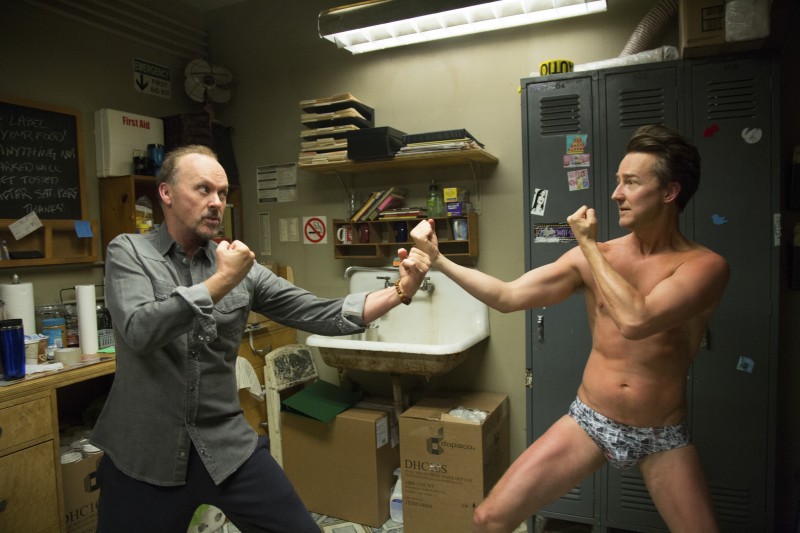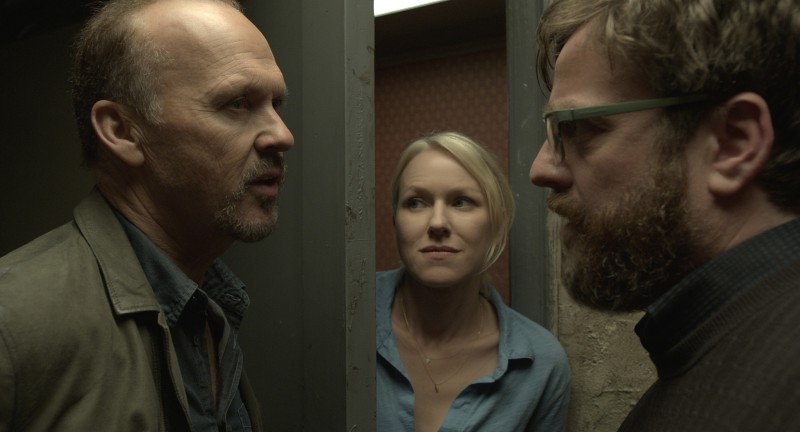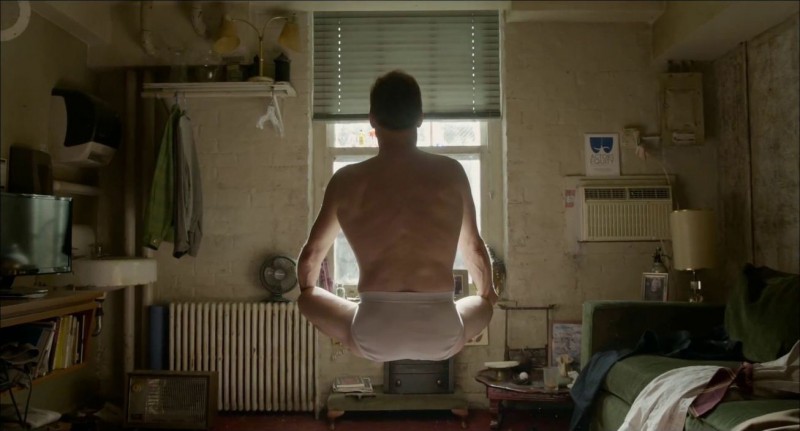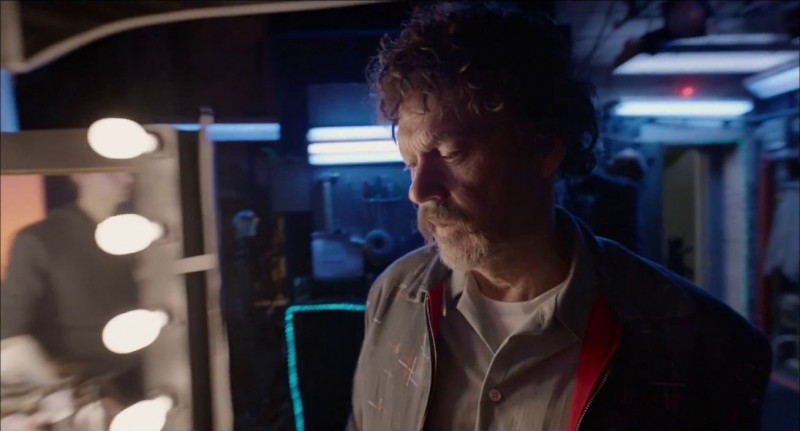Birdman: Review
"One hell of a superhero movie"
Known for his wide-ranging films, set in expansive parts of the globe, Alejandro González Iñárritu reigns in his vision, and places his newest film,
Birdman, inside the cramped corridors of a Broadway Theatre. A welcome departure from style for Iñárritu,
Birdman is both its darkly-humorous and contains a quick paced, improvisational tone.
 Birdman
Birdman opens with a flash of a beach, then cuts to a screaming ball of flames (Icarus) as it bisects the sky, plummeting earthward – threatening to tear apart the atmosphere. Riggin Thomson (Michael Keaton) hovers motionless in his dressing room, meditating quietly. Removed from his state of calm by his daughter, Sam (Emma Stone), Thomson quickly returns to his desperate attempt to resurrect his flailing career (as the once famous Birdman) by writing/directing/starring in his own Broadway play.
The opening scene of
Birdman or
The Unexpected Virtue of Ignorance is the last moment of serenity the audience will have until very late in the third act. Director Alejandro González Iñárritu dives into the work, quietly following Thomson as he races between conversations and conflict. An omniscient, free-moving, yet unobtrusive glimpse into the life of an ex-movie star, Iñárritu's camera is the ghost of Thomson's career that is a constant presence in his life. Never allowing the audience to stop to consider a scene or catch their breath, the camera is relentless in its pursuit of the inter-workings of the theatre, and the characters which inhabit it.

Working closely with his irrationally talented director of photography, Emmanuel Lubezki (
Children of Men,
Tree of Life,
Gravity, its a long list), Iñárritu creates a visual landscape that is entirely new and refreshing. Using “slight of hand” and editing tricks, Lubezki and Iñárritu string together a series of long takes, into one, seamless production. It is an incredible feat, the effect of which is a long stream of consciousness, seemingly blurted out onto the screen, bursting with an almost-unnatural kinetic energy.
Staying true to his love of human emotion and struggle, Iñárritu uses this “long take” to weave together his story. Unlike his past efforts that had various external connections,
Birdman loops around itself over and over, creating a tangle of plot, ensnaring its characters within the cross-stitch narrative. With a lively and sporadic improvisational drum score by Antonio Sanchez, Iñárritu's characters move in an even more sporadic and hectic manner, as they navigate the twisted halls of the theatre. The 21
st Century equivalent of the Overlook Hotel, the myriad of doorways, corridors, and curved staircases makes it impossible to get one's bearings. Characters rushing in and out of doors, closely pressed up against one another as they pass in the narrow halls, adds an electricity to the theatrical environment, and keeps
Birdman moving at an almost unbearable pace.

Michael Keaton's own past has certainly lent credence to his portrayal of the washed-up Thomson. Both men are first-movers in the super hero genre, only to have been surpassed and forgotten by today's sci-fi obsessed culture, and both have intimate knowledge of being catapulted into stardom. Certainly chosen, in part, because of his connections with the character, Keaton is wonderful as the forlorn, and mentally-on-edge Thomson. Swinging wildly through a diverse emotional range, Keaton imparts a manic energy to Thomson that is a profound reflection of the filming technique. Backed up by superb performances by Edward Norton as the damagingly-honest Mike Shiner, and Emma Stone as Thomson's drug-addled and depressed daughter. Each acting as yet another point of contention in Thomson's life, Iñárritu gives them just enough spotlight to really shine in their secondary roles, and offer up some of the more profound dialogue in the film.
Keaton's Thomson is one of the more relatable (and pitiable) antiheroes in recent film history. Fighting to derive meaning from his life, and more importantly to him, gain widespread acclaim, Thomson is obsessed with his play. Based on a short story, “What We Talk About When We Talk About Love” by Raymond Carver, Thomson's play is seen as homage to the man (Carver) who gave him the confidence to be an actor. Yet, Thomson has incorrectly interpreted the work, and a large part of his life, owing largely to the values Hollywood (and modern culture) instilled upon him; skewing wildly towards meaningless drivel. In a interview Thomson gives to several figures of the media, a conversation regarding philosophy is derailed by questions from a TMZ-styled “journalist” gossiping about pig semen injections. Further condemnations of Hollywood pop culture permeate the film, and come to a roaring head in an epic clash between reality and Thomson's waning sanity.

With
Birdman or (The Unexpected Virtue of Ignorance), Alejandro González Iñárritu departs from traditional filmmaking, and his own cinematic style, to deliver a searing indictment of mainstream Hollywood with enough flourishing of surrealism to make fellow Mexican (for a large chunk of his career, anyway) filmmaker, Luis Buñuel proud.
Pros
- Fantastic direction and cinematography
- Wonderful staging and choreography of scenes
- Brilliant performances by Keaton, Norton, and Stone
- Loved the surrealism
Cons
- The old people behind me talked the whole movie
 Birdman opens with a flash of a beach, then cuts to a screaming ball of flames (Icarus) as it bisects the sky, plummeting earthward – threatening to tear apart the atmosphere. Riggin Thomson (Michael Keaton) hovers motionless in his dressing room, meditating quietly. Removed from his state of calm by his daughter, Sam (Emma Stone), Thomson quickly returns to his desperate attempt to resurrect his flailing career (as the once famous Birdman) by writing/directing/starring in his own Broadway play.
The opening scene of Birdman or The Unexpected Virtue of Ignorance is the last moment of serenity the audience will have until very late in the third act. Director Alejandro González Iñárritu dives into the work, quietly following Thomson as he races between conversations and conflict. An omniscient, free-moving, yet unobtrusive glimpse into the life of an ex-movie star, Iñárritu's camera is the ghost of Thomson's career that is a constant presence in his life. Never allowing the audience to stop to consider a scene or catch their breath, the camera is relentless in its pursuit of the inter-workings of the theatre, and the characters which inhabit it.
Birdman opens with a flash of a beach, then cuts to a screaming ball of flames (Icarus) as it bisects the sky, plummeting earthward – threatening to tear apart the atmosphere. Riggin Thomson (Michael Keaton) hovers motionless in his dressing room, meditating quietly. Removed from his state of calm by his daughter, Sam (Emma Stone), Thomson quickly returns to his desperate attempt to resurrect his flailing career (as the once famous Birdman) by writing/directing/starring in his own Broadway play.
The opening scene of Birdman or The Unexpected Virtue of Ignorance is the last moment of serenity the audience will have until very late in the third act. Director Alejandro González Iñárritu dives into the work, quietly following Thomson as he races between conversations and conflict. An omniscient, free-moving, yet unobtrusive glimpse into the life of an ex-movie star, Iñárritu's camera is the ghost of Thomson's career that is a constant presence in his life. Never allowing the audience to stop to consider a scene or catch their breath, the camera is relentless in its pursuit of the inter-workings of the theatre, and the characters which inhabit it.
 Working closely with his irrationally talented director of photography, Emmanuel Lubezki (Children of Men, Tree of Life, Gravity, its a long list), Iñárritu creates a visual landscape that is entirely new and refreshing. Using “slight of hand” and editing tricks, Lubezki and Iñárritu string together a series of long takes, into one, seamless production. It is an incredible feat, the effect of which is a long stream of consciousness, seemingly blurted out onto the screen, bursting with an almost-unnatural kinetic energy.
Staying true to his love of human emotion and struggle, Iñárritu uses this “long take” to weave together his story. Unlike his past efforts that had various external connections, Birdman loops around itself over and over, creating a tangle of plot, ensnaring its characters within the cross-stitch narrative. With a lively and sporadic improvisational drum score by Antonio Sanchez, Iñárritu's characters move in an even more sporadic and hectic manner, as they navigate the twisted halls of the theatre. The 21st Century equivalent of the Overlook Hotel, the myriad of doorways, corridors, and curved staircases makes it impossible to get one's bearings. Characters rushing in and out of doors, closely pressed up against one another as they pass in the narrow halls, adds an electricity to the theatrical environment, and keeps Birdman moving at an almost unbearable pace.
Working closely with his irrationally talented director of photography, Emmanuel Lubezki (Children of Men, Tree of Life, Gravity, its a long list), Iñárritu creates a visual landscape that is entirely new and refreshing. Using “slight of hand” and editing tricks, Lubezki and Iñárritu string together a series of long takes, into one, seamless production. It is an incredible feat, the effect of which is a long stream of consciousness, seemingly blurted out onto the screen, bursting with an almost-unnatural kinetic energy.
Staying true to his love of human emotion and struggle, Iñárritu uses this “long take” to weave together his story. Unlike his past efforts that had various external connections, Birdman loops around itself over and over, creating a tangle of plot, ensnaring its characters within the cross-stitch narrative. With a lively and sporadic improvisational drum score by Antonio Sanchez, Iñárritu's characters move in an even more sporadic and hectic manner, as they navigate the twisted halls of the theatre. The 21st Century equivalent of the Overlook Hotel, the myriad of doorways, corridors, and curved staircases makes it impossible to get one's bearings. Characters rushing in and out of doors, closely pressed up against one another as they pass in the narrow halls, adds an electricity to the theatrical environment, and keeps Birdman moving at an almost unbearable pace.
 Michael Keaton's own past has certainly lent credence to his portrayal of the washed-up Thomson. Both men are first-movers in the super hero genre, only to have been surpassed and forgotten by today's sci-fi obsessed culture, and both have intimate knowledge of being catapulted into stardom. Certainly chosen, in part, because of his connections with the character, Keaton is wonderful as the forlorn, and mentally-on-edge Thomson. Swinging wildly through a diverse emotional range, Keaton imparts a manic energy to Thomson that is a profound reflection of the filming technique. Backed up by superb performances by Edward Norton as the damagingly-honest Mike Shiner, and Emma Stone as Thomson's drug-addled and depressed daughter. Each acting as yet another point of contention in Thomson's life, Iñárritu gives them just enough spotlight to really shine in their secondary roles, and offer up some of the more profound dialogue in the film.
Keaton's Thomson is one of the more relatable (and pitiable) antiheroes in recent film history. Fighting to derive meaning from his life, and more importantly to him, gain widespread acclaim, Thomson is obsessed with his play. Based on a short story, “What We Talk About When We Talk About Love” by Raymond Carver, Thomson's play is seen as homage to the man (Carver) who gave him the confidence to be an actor. Yet, Thomson has incorrectly interpreted the work, and a large part of his life, owing largely to the values Hollywood (and modern culture) instilled upon him; skewing wildly towards meaningless drivel. In a interview Thomson gives to several figures of the media, a conversation regarding philosophy is derailed by questions from a TMZ-styled “journalist” gossiping about pig semen injections. Further condemnations of Hollywood pop culture permeate the film, and come to a roaring head in an epic clash between reality and Thomson's waning sanity.
Michael Keaton's own past has certainly lent credence to his portrayal of the washed-up Thomson. Both men are first-movers in the super hero genre, only to have been surpassed and forgotten by today's sci-fi obsessed culture, and both have intimate knowledge of being catapulted into stardom. Certainly chosen, in part, because of his connections with the character, Keaton is wonderful as the forlorn, and mentally-on-edge Thomson. Swinging wildly through a diverse emotional range, Keaton imparts a manic energy to Thomson that is a profound reflection of the filming technique. Backed up by superb performances by Edward Norton as the damagingly-honest Mike Shiner, and Emma Stone as Thomson's drug-addled and depressed daughter. Each acting as yet another point of contention in Thomson's life, Iñárritu gives them just enough spotlight to really shine in their secondary roles, and offer up some of the more profound dialogue in the film.
Keaton's Thomson is one of the more relatable (and pitiable) antiheroes in recent film history. Fighting to derive meaning from his life, and more importantly to him, gain widespread acclaim, Thomson is obsessed with his play. Based on a short story, “What We Talk About When We Talk About Love” by Raymond Carver, Thomson's play is seen as homage to the man (Carver) who gave him the confidence to be an actor. Yet, Thomson has incorrectly interpreted the work, and a large part of his life, owing largely to the values Hollywood (and modern culture) instilled upon him; skewing wildly towards meaningless drivel. In a interview Thomson gives to several figures of the media, a conversation regarding philosophy is derailed by questions from a TMZ-styled “journalist” gossiping about pig semen injections. Further condemnations of Hollywood pop culture permeate the film, and come to a roaring head in an epic clash between reality and Thomson's waning sanity.
 With Birdman or (The Unexpected Virtue of Ignorance), Alejandro González Iñárritu departs from traditional filmmaking, and his own cinematic style, to deliver a searing indictment of mainstream Hollywood with enough flourishing of surrealism to make fellow Mexican (for a large chunk of his career, anyway) filmmaker, Luis Buñuel proud.
With Birdman or (The Unexpected Virtue of Ignorance), Alejandro González Iñárritu departs from traditional filmmaking, and his own cinematic style, to deliver a searing indictment of mainstream Hollywood with enough flourishing of surrealism to make fellow Mexican (for a large chunk of his career, anyway) filmmaker, Luis Buñuel proud.